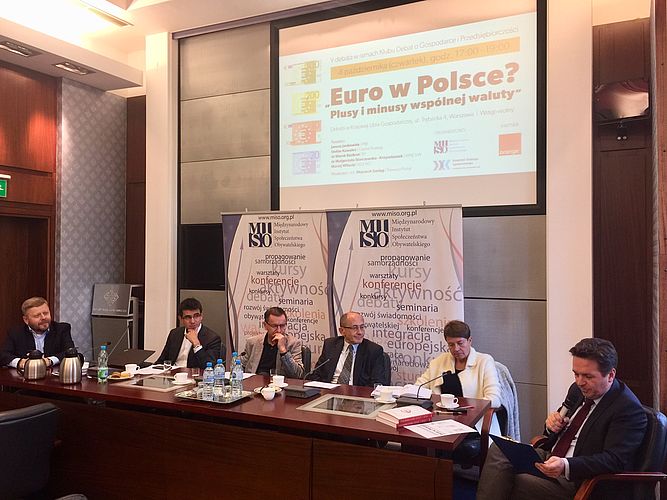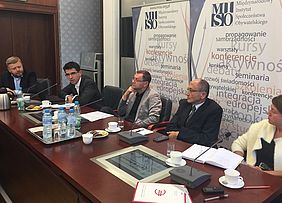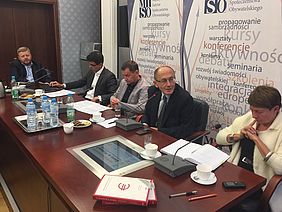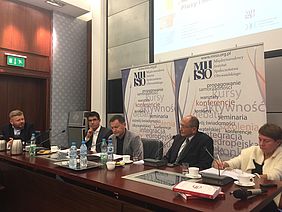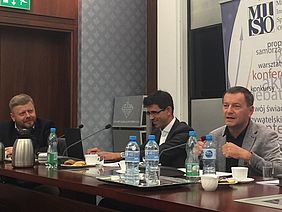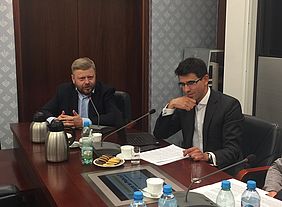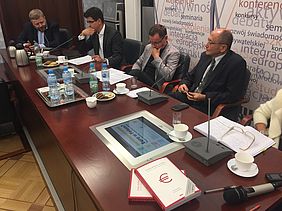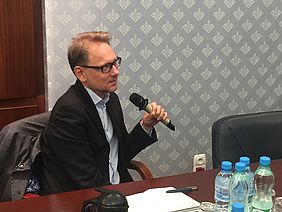The following panellists took part in the debate: Janusz Jankowiak (Main Economist of the Polish Business Council), Stefan Kawalec (the President of Capital Strategy), dr Marek Rozkrut (Partner, Main Economist of Ernst & Young), dr Małgorzata Starczewska-Krzysztoszek (Faculty of the Economic Sciences of University of Warsaw) and Maciej Witucki (Chairman of the Social Dialogue Committee of the National Chamber of Commerce), the discussion was moderated by Wojciech Szeląg (Polsat television).
The debate started with relating to an open letter from January 2018 in which economists appealed Prime Minister Mateusz Morawiecki for resuming preparations to introduce common currency in Poland. Two of the authors of the letter were at the same time panellists of our debate - Małgorzata Starczewska-Krzysztoszek and Janusz Jankowiak. – I do not perceive Eurozone as an optimal currency market. We do not take this into consideration at the time being – Prime Minister replied.
Maciej Witucki from the Social Committee of KIG pointed out that he has noticed a decrease of trust for the community in many UE countries. In his opinion it is due to the fact that the governments of these countries consequently pass the responsibility of their unpopular economic decisions onto EU. He reminded that, paradoxically, in 2003 many Poles voted in favor of Polish accession to the community since the Union was supposed to safeguard us against madness of our own administration. Until now part of the entrepreneurs has still been of an opinion that Euro is a safer currency that the domestic currency, dependent on the domestic politics becoming more and more populist. However, taking into consideration the economic factors it has to be said that introducing Euro is a declaration of the support for further European integration. If we want to integrate more we have to sit at the table at which the most important debates are held and in which countries belonging to Eurozone participate.
The panellists pointed out that many myths connected with Euro have emerged, which still have to be systematically tackled. Euro currency unfortunately is being associated with high prices. Dr Marek Rozkrut (Partner, Main Economist of Ernst & Young) admitted that there are examples of some products with increased process but it is usually connected with the change in the structure of the price and their rounding up. In the long term perspective – as the research shows - the effect becomes less visible. Moreover, in every country which has Euro currency there are definitely more supporters than opponents of the common currency, which fact alone speaks for itself.
Dr Małgorzata Starczewska-Krzysztoszek mentioned about her research on small and medium entrepreneurs. Despite the fact that they participate in the international exchange to a smaller extent (which means they do not bear the risk of change of currency of a transaction) the majority of them is still in favor of introducing Euro currency. They are of course aware of the risks such as bigger competition due to direct, and not indirect comparability. Big entrepreneurs which are present at the international markets are aware of the fact that common currency would improve their competitiveness. In the economist’s opinion the convergence criteria are met by Poland.
Dr Marek Rozkrut during the debate used the example of Bulgaria which has declared the will of introducing Euro. The reply of EU was quite surprising. First of all, EU issued an official statement in this matter, although until now the negotiations have been kept in secret, in order to publish their results and minimize the influence on the market. Moreover, the Commission has restricted the criteria and successfully lowered the level of emotions connected with Bulgaria’s declaration. What is more, UE declared than other countries will have to meet the criteria in the future. This means that entering common currency club will become more difficult.
Not all panellists agreed on the Poland’s need to introduce common currency. Stefan Kawalec (President of Capital Strategy) compared countries with Euro currency to groups of people going for a bike ride and choosing a lighter type of bike, improper for uneven surfaces. Unfortunately the route ahead is bumpy and uneven. Therefore some of the people are forced to cover the route on foot and carry the bike beside them up the hill, others are forced to help the weaker ones and hold their baggage. In the end cyclists are late and unsatisfied. In conclusion it is better to choose a heavier bike – although it slows the route from time to time – since in the event of uneven route we have a possibility to react properly, using for example an appropriate shifter. The President of Capital Strategy also pointed out the Nordic countries which in his opinion show rational attitude towards monetary policy and for a reason avoid introducing Euro.
On the other hand according to Janusz Jankowiak from the Polish Business Council the example of Nordic countries does not give grounds for such conclusions. Especially due to the fact that their central banks, despite their independence and their own currency, follow the decisions of Central Bank. What is more, Eurozone has survived many crises. They have revealed flaws of the concept but today we may make use the experience. Currently the ongoing debate on Eurozone concerns improving its post-crisis architecture, not its decomposition. New ideas are based on two concepts: division of risk and fiscal transfer. Economists have generated few very good ideas which are meant to improve solidarity with full market discipline.
The debate was organized by the International Institute of Civil Society, the Social Dialogue Committee of the National Chamber of Commerce (organizers) and Orange Polska (partner).


